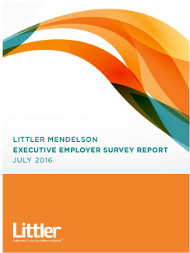 Littler Mendelson, the world’s largest employment and labor law practice representing management, has released the results of its 2016 Executive Employer Survey. The fifth annual survey, completed by 844 in-house counsel, human resources professionals and C-suite executives from some of America’s largest companies, examines the key legal, economic and social issues impacting employers as the 2016 presidential election approaches.
Littler Mendelson, the world’s largest employment and labor law practice representing management, has released the results of its 2016 Executive Employer Survey. The fifth annual survey, completed by 844 in-house counsel, human resources professionals and C-suite executives from some of America’s largest companies, examines the key legal, economic and social issues impacting employers as the 2016 presidential election approaches.
New Overtime Rules, Aggressive DOL Enforcement Plague Employers
The Department of Labor (DOL) has advanced several regulatory initiatives that have brought the agency’s enforcement of federal employment laws more to the forefront for employers. The vast majority of respondents to this year’s survey (82 percent) expect DOL enforcement to have an impact on their workplace over the next 12 months, with 31 percent anticipating a significant impact (up from 18 percent in the 2015 survey).
This concern is no doubt driven in large part by the recently finalized Fair Labor Standard Act “white collar” overtime regulations that drastically increase the number of Americans who can qualify for overtime pay. Although respondents completed the survey in the weeks prior to the release of the final rule, 65 percent had already conducted audits to identify affected employees.
“Employers are clearly feeling the impact of the DOL’s increasingly aggressive regulatory agenda, most notably the new overtime regulations,” said Littler attorneys Tammy McCutchen and Lee Schreter in a joint statement. “While it is encouraging that the majority of respondents started to prepare before the rule was finalized, more than a quarter (28 percent) said they had taken no action given delays in the rulemaking process. Given that the reclassification process can take up to six months and the rule is unlikely to be blocked from going into effect on December 1, 2016, employers should move quickly to ensure compliance.”
Further, in ranking the priority they expect a presidential candidate from each party to place on various issues, the majority of respondents (75 percent) said income inequality (e.g., overtime rules, state equal pay, minimum wage laws, etc.) would be a significant priority of the Democratic candidate. This is in comparison to only 4 percent who felt income inequality would be a significant priority of the Republican candidate.
Joint Employer, ACA among Top Regulatory and Legislative Issues Facing Workplace
Increased DOL enforcement is just one example of employers grappling with a continuously shifting regulatory and enforcement landscape, as federal agencies continue to be the governmental bodies inflicting the most pressure on employers.
With the National Labor Relations Board’s recent expansion of the definition of a “joint employer,” 70 percent of respondents expect a rise in claims over the next year based on actions of subcontractors, staffing agencies and franchisees. Approximately half of respondents predicted higher costs (53 percent) and increased caution in entering into arrangements that might constitute joint employment (49 percent).
“It is significant and telling that only 2 percent of respondents said the expanded definition of a joint employer will have no impact on their workplace,” said Michael Lotito, co-chair of Littler’s Workplace Policy Institute. “This finding shows the breadth of the NLRB’s decision, overturning a standard of joint employment that had been in place for decades, which required a relationship that was actual, direct and substantial.”
As was the case in the 2015 survey, 85 percent of employers said the Affordable Care Act (ACA) would have an impact on their workplace in the next 12 months. While two-thirds said they do not expect a repeal of the ACA if a Republican is elected president this fall, respondents saw a greater likelihood of changes to individual provisions. Fifty-three percent said a Republican administration could lead to a repeal of or changes to the Cadillac excise tax and 48 percent saw a likelihood for changes to the play-or-pay mandate.
Rising Public Attention to Social Issues Influences the Workplace
Employers have always had to keep an eye on demographic and social trends, but as information spreads more rapidly and as office culture shifts to accommodate a new generation, today’s companies are increasingly experiencing the incursion of social issues into the workplace.
In the largest year-over-year change in Littler’s survey results, 74 percent of respondents expect more discrimination claims over the next year related to the rights of LGBT workers (up from 31 percent in 2015) and 61 percent expect more claims based on equal pay (up from 34 percent in 2015). This change is driven by LGBT discrimination and equal pay ranking among the top enforcement priorities for the Equal Employment Opportunity Commission (EEOC), but it also mirrors key focus areas for the Obama administration, government efforts at the state and federal levels, and increased public awareness.
“The EEOC has sent a clear signal that it will continue to prioritize rooting out discrimination based on sexual orientation and equal pay, so employers’ instincts that claims in this area will likely rise are right on the mark,” said Barry Hartstein, co-chair of Littler’s EEO & Diversity practice. “As LGBT rights and the gender pay gap continue to be in the headlines and topics of discussion among the general public, employers can expect to face increased pressure to address these issues in the workplace.”
In addition, the changing nature of work and the rise of the so-called gig economy have given companies more hiring options than ever, including independent contractors, contingent workers and an online workforce. While this shift has created greater flexibility for workers and increased efficiency for employers, it has also given rise to more independent contractor misclassification lawsuits and regulatory investigations. Despite the legal challenges, more than half of respondents at large-cap organizations either said they were not reluctant to hire more freelancers or contractors (24 percent) or they were neutral on the matter (35 percent).
Employers Take Steps to Prevent Workplace Violence
In response to tragic mass shootings across the nation, companies are taking a range of actions to keep their employees safe, including updating or implementing a zero-tolerance workplace policy (52 percent), conducting pre-employment screenings (40 percent) and holding training programs (38 percent). Only 11 percent of respondents said they had not taken any action because violence is not a concern for their company.
“Putting policies in place to increase awareness of workplace violence and ensure that employees understand how to report threats in the workplace are steps that all employers would be advised to take,” said Terri Solomon, a Littler shareholder with extensive experience counseling employers on workplace violence prevention. “Unfortunately, even though workplace violence – and particularly active shooter instances – are statistically rare, no employer is truly immune, so taking preventative action can help save lives.”
View the 2016 Executive Employer Survey Report here: http://www.littler.com/files/2016_littler_executive_employer_survey.pdf
About Littler
Littler is the largest global employment and labor law practice, with more than 1,000 attorneys in over 70 offices worldwide. Littler represents management in all aspects of employment and labor law and serves as a single-source solution provider to the global employer community. Consistently recognized in the industry as a leading and innovative law practice, Littler has been litigating, mediating and negotiating some of the most influential employment law cases and labor contracts on record for over 70 years. Littler Global is the collective trade name for an international legal practice, the practicing entities of which are separate and distinct professional firms. For more information visit: www.littler.com.







 Wearable electronic monitoring devices have been long used to help monitor an individual’s health and fitness, writes
Wearable electronic monitoring devices have been long used to help monitor an individual’s health and fitness, writes  Littler Mendelson
Littler Mendelson